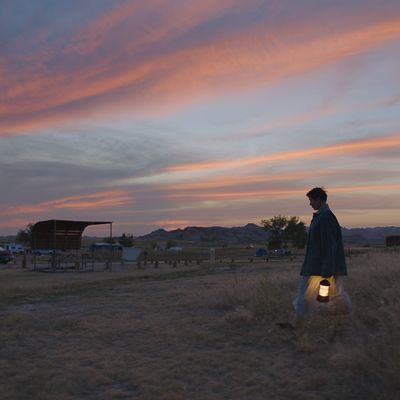
This review originally ran in September, during the Toronto International Film Festival, but we are republishing it on the occasion of the movie’s limited digital release in the U.S.
Fern (Frances McDormand), the solitary traveler whose wanderings make up Nomadland, is killing time in the fluorescent-lit confines of a big-box store when she runs into people she used to know — a mother and children with whom, not so long ago, Fern had shared a community. Their small Nevada company town had rapidly withered and died after the gypsum plant that sustained it was shut down. While everyone else moved on, the widowed Fern just moved out, putting her things into storage and living in her van, which she kitted out with a mattress and a small stove. It’s cold outside, which is why she’s hanging out in the sporting-goods section, and as she and her former neighbors stand there, one of the daughters asks — with the ease of a teenager who has not yet been taught to project shame onto others — if it’s true that Fern is homeless now. “I’m not homeless, I’m just houseless,” Fern responds firmly. “Not the same thing, right?”
Nomadland is a devastating film about the delicacies of that distinction, and it could very well be the feature of the year, as uncertain a prize as that is in 2020. A fictional adaptation of a nonfiction book by Jessica Bruder, it uses Fern as a lens through which to view a subculture of travelers who live out of RVs and cars and pick up gigs as they move around the country. Like Fern, many of them are near retirement age but without the option or inclination to retire, and, instead of struggling to sustain what they once had, they’ve whittled down their needs. They’re refugees of the last recession, of rising housing costs, of a threadbare safety net — though director Chloé Zhao, who also wrote the screenplay, refuses to reduce them merely to byproducts of our increasingly callous capitalist system. Through choice or necessity, they’ve traded career grinds and the lure of the property ladder for a precarious but carefully guarded kind of liberation — one supported by stints packaging products in sprawling Amazon warehouses or loading beets onto trucks for the Western Sugar Cooperative. They are trying to throw off what one of the movement’s spokespeople calls “the yoke of the tyranny of the dollar.”
At an annual gathering of travelers out in the Arizona desert, attendees talk around a fire at night about how their lifestyle can be a means of managing PTSD, or of healing from the loss of loved ones. They actually spend time doing things outdoors — instead of waiting around to have the time. These people are pilgrims as much as exiles, and Nomadland is a movie of melancholy grandeur about the American West told through their stories of hard-won independence. This comes as no surprise; the Beijing-born Zhao has proven herself to be the best big-screen chronicler of the region, both as an actual place as rugged territory and stunning landscapes, and as a concept at the heart of our national mythology. Her first two features, Songs My Brothers Taught Me and The Rider, took place on the Pine Ridge Reservation in South Dakota, with casts entirely made up of locals who sometimes played variations on themselves. A lot of the performers in this new film are also non-pros — and some of them real-life nomads — though this time around she’s working with two established acting talents: McDormand, who also served as a producer, and David Strathairn as Dave, a fellow vagabond who takes a shine to Fern.
It’s not a seamless combination, though that’s not the fault of McDormand, who, with her wary eyes and careworn expression, slots in easily alongside actual travelers like the nature-loving Swankie and the savvy Linda May. Fern is just more obviously a creation, her utility evident when she’s stringing together episodic encounters with strangers or enabling someone to make a point that didn’t need to be spoken aloud — like when her sister, Dolly (Melissa Smith), stoutly proclaims Fern part of a tradition, “like the pioneers.” It takes a while for Fern to firm up into a character rather than a narrative vehicle, though when she does, she emerges as a fascinatingly contradictory figure in her own right. She is someone who’s still in mourning and in whom the desires for connection and freedom are constantly at war. She hasn’t been abandoned, either by strangers or those who know her — throughout the film, people offer to take her in. But that is never what she wants. In the nomads, who cross paths and help each other but never try to hold on to one another too tightly, she seems to have found her people.
They’re a people who owe something to the past, and the film makes a heartrending reference to a famous shot late in its runtime that places Fern explicitly at the end of a long line of characters who feel they can only exist on the edges of civilization. But they’re just as much born of a potentially-approaching collapse — utterly unsentimental in their self-sufficiency, expecting nothing of anyone else. Their influence makes the movie more moving. Through these characters, Zhao is able to examine the idea of wide-open frontiers without nostalgia or the need to pathologize the parts of our social structures that are eroding or have failed. Those shots of Fern, a tiny, determined dot out there on a stunning panorama, are breathtaking and elegiac. She is a woman eking out the life she wants to lead, a woman who has gone to look for America.
More Movie Reviews
- The Accountant 2 Can Not Be Taken Seriously
- Another Simple Favor Is So Fun, Until It Gets So Dumb
- Errol Morris Has Been Sucked Into the Gaping Maw of True Crime


